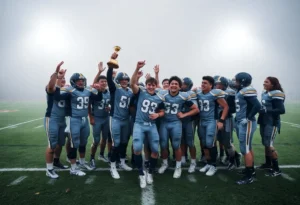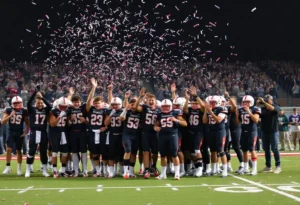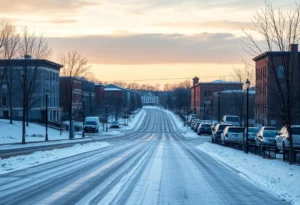Buffalo, New York – A proposed class-action lawsuit has been filed against the NCAA, claiming the organization is violating antitrust laws by prohibiting hockey players who participated in Canadian Hockey League (CHL) games from joining NCAA teams. The lawsuit, submitted on August 12 in the U.S. District Court of Western New York, names several colleges and universities along with the NCAA as defendants. Notable institutions include Canisius University, Niagara University, Boston College, and University of Notre Dame.
The lead plaintiff, Rylan Masterson, is an athlete who played two games for the Windsor Spitfires in the CHL at the age of 16. As a result of this involvement, he lost his chance to play for an NCAA team. The lawsuit indicates that any athlete who played for a CHL or NCAA team since August 12, 2020, can join the suit.
According to Stephen Lagos, the attorney representing Masterson, the NCAA’s ban has blocked young players from pursuing their best career options for years. Lagos expressed hope that the lawsuit will end what he describes as an unfair practice and provide compensation to affected players.
Requests for comments from the NCAA and several of the mentioned colleges were not returned, although some schools acknowledged awareness of the lawsuit. It’s important to note that the claims have yet to be proven in court.
This situation comes amid broader changes in the NCAA, which has faced various challenges regarding its business model based on athlete amateurism. Recently, a landmark settlement could pave the way for NCAA schools to pay athletes directly, leading to a significant shift in how college athletics operates. This lawsuit adds another layer to the ongoing discussions about how collegiate sports should function.
The filling argues that the NCAA rule limiting CHL players effectively suppresses player compensation and diminishes competition. The lawsuit characterizes this situation as a “group boycott” and claims it violates antitrust laws because it forces young players to make difficult choices at an early age.
The NCAA maintains this rule in the name of protecting amateurism, but allegations suggest the actual purpose is to damage the CHL, which competes directly with the NCAA for talented young players.
The tensions surrounding this case highlight a moment of significant change. As the NCAA faces pressure from lawsuits and legislative actions, decisions made now could deeply impact the future of college hockey, the athletes involved, and the institutions that support them.
Author: STAFF HERE ROCK HILL
The ROCK HILL STAFF WRITER represents the experienced team at HERERockHill.com, your go-to source for actionable local news and information in Rock Hill, York County, and beyond. Specializing in "news you can use," we cover essential topics like product reviews for personal and business needs, local business directories, politics, real estate trends, neighborhood insights, and state news affecting the area—with deep expertise drawn from years of dedicated reporting and strong community input, including local press releases and business updates. We deliver top reporting on high-value events such as the Come-See-Me Festival, Rock Hill Arts Festival, and motorsport events at the Rock Hill Velodrome. Our coverage extends to key organizations like the Rock Hill Chamber of Commerce and the Culture & Heritage Museums, plus leading businesses in manufacturing and technology that power the local economy such as 3D Systems and Comporium. As part of the broader HERE network, including HEREAiken.com, HEREBeaufort.com, HEREChapin.com, HERECharleston.com, HEREClinton.com, HEREColumbia.com, HEREGeorgetown.com, HEREGreenwood.com, HEREGreenville.com, HEREHiltonHead.com, HEREIrmo.com, HEREMyrtleBeach.com, HERENewberry.com, HERERockHill.com, and HERESpartanburg.com, we provide comprehensive, credible insights into South Carolina's dynamic landscape.








